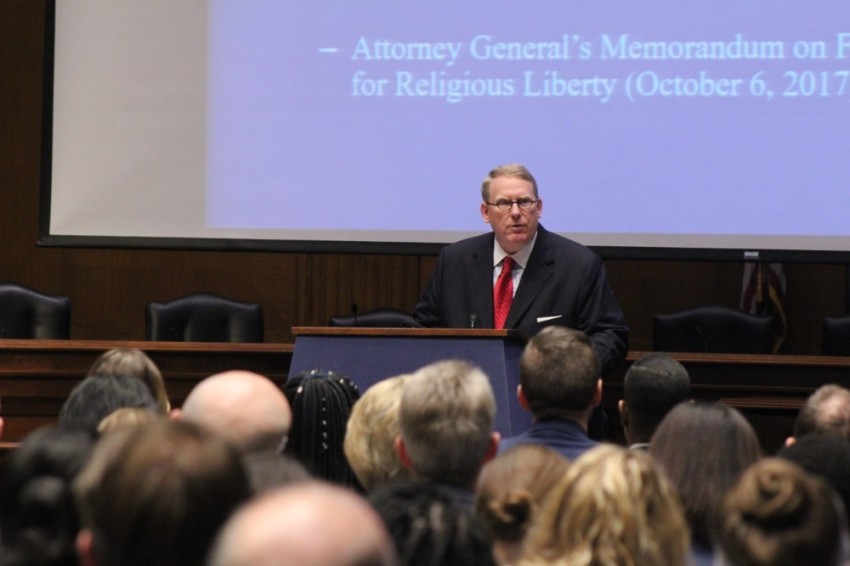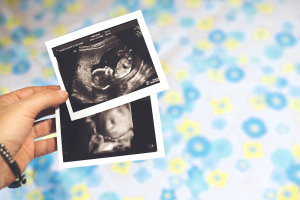3 ways the Education Dept. is protecting religious freedom for Christian colleges

WASHINGTON — A U.S. Department of Education regulatory reform officer has assured the nation’s Christian colleges that the agency is taking several steps to protect the religious liberty of their institutions and students, including a proposed rule currently up for public comment.
Robert Eitel, the senior counselor to Secretary of Education Betsy DeVos, spoke at the Council for Christian College & Universities Presidents Conference on Capitol Hill Wednesday.
“The secretary is committed to respecting your convictions and free exercise of religious beliefs that our Constitution has protected,” Eitel told the audience gathered in the Dirksen Senate Office Building. “The freedom of religion is more than simply freedom. It is much more. In fact, Secretary DeVos says the First Amendment doesn’t exist to protect us from religion. It exists to protect religion from the government.”
Eitel, a lawyer who previously served as vice president for regulatory compliance for several post-secondary institutions, detailed various ways the administration is trying to ensure that faith-based institutions are not disadvantaged because of their religious mission.
He pointed out that President Donald Trump “set the table” for promoting religious freedom across all federal agencies with an executive order in 2017.
Also, the U.S. Supreme Court’s Trinity Lutheran ruling in 2017 and then-Attorney General Jeff Sessions’ 2017 memorandum on religious liberty have “laid the groundwork” for DeVos to propose important changes to the department's regulations and rules, he added.
Accreditation
Last year, the department proposed a new rule to change accreditation regulations under the Higher Education Act. The final rule is set to go into effect this July. Eitel highlighted a few provisions in the rule that are of note to Christian higher education institutions.
“The takeaway is this,” he said. “An accreditation agency may not use as a negative factor the fact that you are a faith-based institution, that you have a religious mission.”
Concern was raised by Christian college leaders in 2018 after one accreditation agency proposed a new policy that would have removed a requirement for the agency to take into account institutions’ "specific and diverse" missions when assessing the schools’ commitment to diversity.
Eitel said the new rule defines what a religious mission is under the Higher Education Act.
“Congress mandated that agencies respect the diversity of missions in institutions, including religious missions. But there is no definition. We provided one in our regulation,” he said.
He explained that the definition of religious mission as defined by the rule is: “the published institutional mission that is approved by the governing body of an institution of postsecondary education that includes, refers to or is predicated by religious tenets, beliefs or teachings.”
“What is important there is this: There are several regulatory references … that relate to how accreditation agencies handle the issue of religious mission in schools. There are mandates in the regulation that require accreditation agencies to ensure consistency in decision making when it comes to faith-based institutions. There are also provisions related to procedures for submitting an application for recognition by accrediting agencies in the department and how the department [enforces] those regulations.”
Eitel said that the department is in the process of consulting with accreditation agencies about how they can comply with the new rule.
“We intend to enforce this aspect … in our own review of accreditation agencies,” he stated.
Title IV
In December, the Education Department proposed another rule that was open for public comment until Jan. 10.
The rule, which is expected to be enacted in July, would expand access to Teacher Education Assistance for College and Higher Education (TEACH) Grants so as to ensure that religious freedom rights of faith-based schools and students are “respected.”
The rule states that the department cannot discriminate against “otherwise eligible students and faith-based entities” by disqualifying them from Title IV Higher Education Act programs because of their religious convictions or beliefs.
“We have proposed to eliminate certain limitations on the ability of faith-based institutions to participate ... and to ensure they are included in the program,” Eitel said. “We hope to avoid issues up the road.”
HBCU
Eitel said that last September, DeVos told Congress that a statutory provision of the Historically Black Colleges and Universities Capital Financing Program was unconstitutional. At issue was Section 344 of the Higher Education Act barring the use of loans for capital improvements to HBCU schools “in which a substantial portion of its functions is subsumed in a religious mission.”
The Department of Education considers that provision to be “unenforceable” because it singles out a class of schools based solely on their religious status.
Eitel compared the provision to a policy struck down by the U.S. Supreme Court in 2017. The high court ruled at the time that the Missouri government could not discriminate against churches when handing out funding for a secular grant program.
Last September, President Donald Trump vowed that his administration would lift restrictions on capital financing funds for faith-based historically black colleges and seminaries.
On Jan. 17, the department published a proposed rule that is open for public comment until Feb. 18.
“What is important for you to know about the proposed rule is that it does a number of things,” Eitel said. “One deals with leveling the playing field for your schools in regards to grants and programs outside of Higher Education Act.”
Walter Kimbrough, president of the historically-black Dillard University in Louisiana, a school affiliated with United Methodist Church and the United Church of Christ, reached out to CP to argue that the administration is overstating its claim about how many HBCU institutions the rule change will help.
In September, Trump claimed that there are 40 HBCU schools that are restricted from the Capital Financing Program. But Kimbrough said that claim is inaccurate.
"There are about 40 HBCUs that are private and are church-related. That I guess is what [Trump] was talking about. But we get capital funds," he said. "I went through the recipients list. The only one I saw that didn't get it is a seminary. Based on that law, and it is written very clearly, if the primary purpose is church-related, you wouldn't be eligible. But none of our schools are primarily church-related."
CCCU President Shirley Hoogstra praised the work the Department of Education is doing to clarify policies.
“They want to make sure there is a level playing field, nothing more and nothing less,” Hoogstra told The Christian Post.
“When the government speaks into issues that are ambiguous and makes it clear, it actually helps everybody. It helps the accreditors so they don’t get into trouble, it helps us so that we know what the parameters are for Christian higher education. The department is doing a great job of making sure there is clarity around things that are kind of fuzzy.”
CCCU is an association of over 180 Protestant higher education institutions worldwide. Its annual presidents conference is attended this year by representatives from 85 campuses in over 30 states and nine countries.
Follow Samuel Smith on Twitter: @IamSamSmith
or Facebook: SamuelSmithCP



























